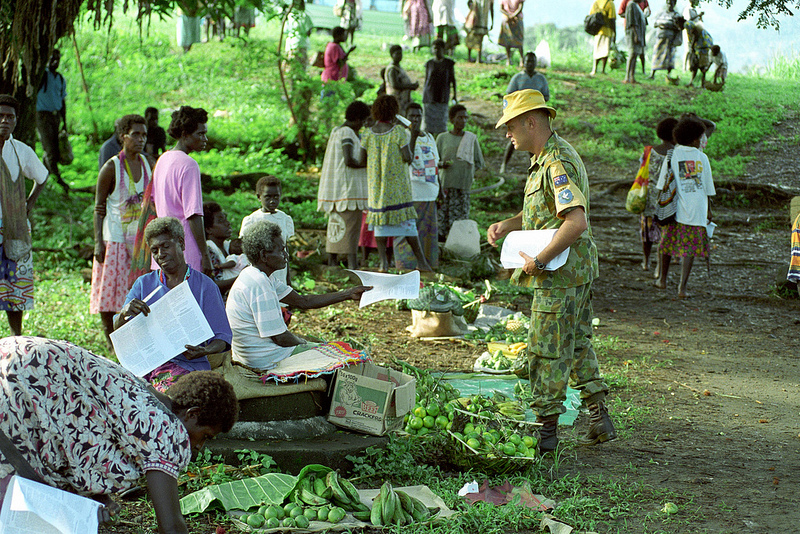Nothing Found
Sorry, no posts matched your criteria
Sorry, no posts matched your criteria
Prime Minister Tony Abbott’s visit to Papua New Guinea will occur at a complex time in a complex relationship with a complex neighbour.
Although warnings that forecasting is a ‘mug’s game for strategists’ are doubly ominous in ‘the land of the unexpected’, Abbott’s scheduled to arrive in Port Moresby this evening, so I’ll recklessly hazard a few observations, some predictions, and even make a suggestion or two.
The idea that PNG is at a ‘crossroads’ has been applied to various issues at several points over the years—most memorably by David Hegarty in 1989 as the Bougainville crisis escalated, economic woes deepened, and the still fairly upbeat ‘post-colonial twilight’ faded into the past. PNG has experienced resource booms every decade from the 1970s on, but it’s still hard to think of another era when the country has simultaneously stood tantalisingly close to really taking-off but also to taking a nasty fall. While there’s probably some life yet in another old trope, that ‘PNG will always muddle through’, the current situation seems more a case of ‘crash-through-or-crash’ than just bumbling along. Read more
I’m grateful to Peter Jennings and Karl Claxton for providing a superb example of the Phase Zero planning in their proposal for Bougainville. Their nine-point recommendation incorporates many of the features of a good Phase Zero plan, especially its paramount aim of forestalling the subsequent phases of a(nother) military intervention. In return, I’d like to respond to their appeal for ideas to help the process.
As Peter and Karl stress, one reason for attempting such a scheme is to save Australia the expense of another peacekeeping effort: spend now to avoid higher costs and risks later. But Bougainville’s mineral wealth offers an opportunity to save some money in the short term as well, by engaging mining interests creatively to fund at least one of their proposals.
Paradoxically, mineral extraction from the fabulous Panguna copper, gold and silver deposit was the catalyst for Bougainville’s troubles going back to 1989. Recognising this, some utopian voices have advocated excluding the mine from Bougainville’s economic future lest the same problems recur. And as Joanne Wallis and others point out, the Autonomous Bougainville Government has achieved some gains with limited resources that don’t include mining revenues. But a good slice of the funds it does have are from sources such as Australian aid that can’t (and shouldn’t) be guaranteed indefinitely. And we shouldn’t forget the economic benefits that Bougainville enjoyed pre-1989 from only a portion of the mine’s revenues. It’d be a tragedy to deny Bougainvilleans these benefits into the future for want of creative solutions to the old problems. As Dame Carol Kidu has said, it’s possible to learn from the past. Read more
 Peter Jennings and Karl Claxton’s recent ASPI Special Report A stitch in time: Preserving peace on Bougainville represents an important—and necessary—attempt to move Bougainville to the centre stage of Australian foreign and strategic policy debates. Bougainville is due to hold a referendum on its political future between 2015 and 2020, and given Australia’s long-standing involvement and interest in Bougainville, and Papua New Guinea more broadly, we’ll be focused on the events that surround the vote. The Report represents a considered attempt to outline what Australia might do to mitigate a recurrence of conflict in Bougainville and to advance the development of the Bougainvillean people.
Peter Jennings and Karl Claxton’s recent ASPI Special Report A stitch in time: Preserving peace on Bougainville represents an important—and necessary—attempt to move Bougainville to the centre stage of Australian foreign and strategic policy debates. Bougainville is due to hold a referendum on its political future between 2015 and 2020, and given Australia’s long-standing involvement and interest in Bougainville, and Papua New Guinea more broadly, we’ll be focused on the events that surround the vote. The Report represents a considered attempt to outline what Australia might do to mitigate a recurrence of conflict in Bougainville and to advance the development of the Bougainvillean people.
But the Report both overestimates Australia’s potential legitimacy and effectiveness in Bougainville, and underestimates the capacity and potential of the Autonomous Bougainville Government (ABG) and its people. Read more
The Prime Minister’s quick visit to Papua New Guinea this week focused on the asylum-seeker issue, but also has some wider security implications.
Although Mr Rudd enjoys good personal relations with Sir Michael Somare, PM Peter O’Neill has a commanding grip on national politics, with most PNG MPs currently behind him, and a different style and priorities. Most younger PNG leaders share O’Neil’s single-minded, unsentimental, focus on PNG’s national interest—witness his decision to travel to Jakarta rather than Noumea when the MSG Leaders Summit was due to consider West Papuan membership last month. (And, indeed, his willingness to go along with the idea that asylum seekers heading this way represent a security problem for the whole region). This forward-looking outlook may assist productive, businesslike ties relatively free of decolonisation-era baggage, but also means we can’t rely so much on a special relationship, with the PNG Government assessing its options on their merits in a more competitive international environment. Read more